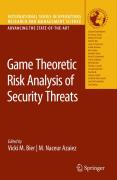
Game Theoretic Risk Analysis of Security Threats introduces reliability and risk analysis in the face of threats by intelligent agents. More specifically, game-theoretic models are developed for identifying optimal and/or equilibriumdefense and attack strategies in systems of varying degrees of complexity. The book covers applications to networks, including problems in both telecommunications and transportation. However, the book's primary focus is to integrate game theory and reliability methodologies into a set of techniques to predict,detect, diminish, and stop intentional attacks at targets that vary in complexity. In this book, Bier and Azaiez highlight work by researchers who combine reliability and risk analysis with game theory methods to create a set of functional tools that can be used to offset intentional, intelligent threats (including threats of terrorism and war). These tools will help to address problemsof global security and facilitate more cost-effective defensive investments. INDICE: Why both game theory and reliability theory are important in defending infrastructure against intelligent attacks.- Game theory models of intelligent actors in reliability analysis: an overview of the state of the art.- Optimizing defense strategies for complex multi-state systems.- Defending against terrorism, natural disaster, and all hazards.- A Bayesian model for a game of information in optimal attack/defense strategies.- Search for a malevolent needle in a benign haystack.- Games and risk analysis: three examples of singleand alternate moves.- Making telecommunications networks resilient against terrorist attacks.- Improving reliability through multi-path routing and link defence: an application of game theory to transport.- Index.
- ISBN: 978-1-4419-4688-1
- Editorial: Springer
- Encuadernacion: Rústica
- Fecha Publicación: 14/03/2012
- Nº Volúmenes: 1
- Idioma: Inglés
